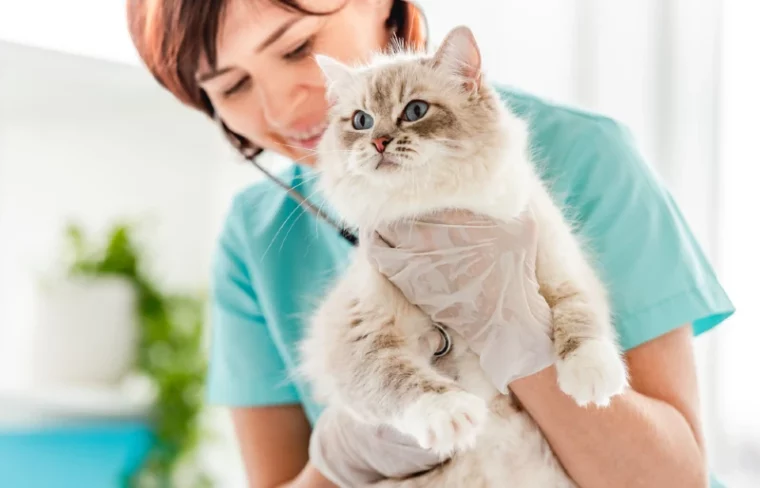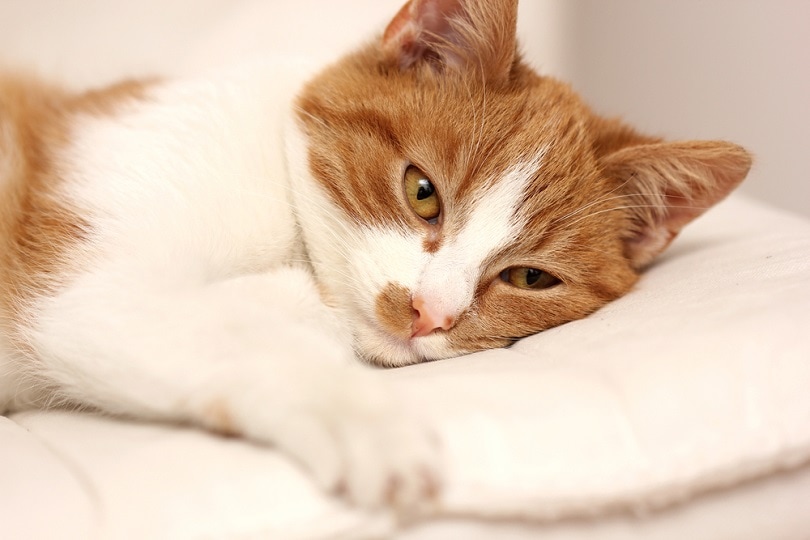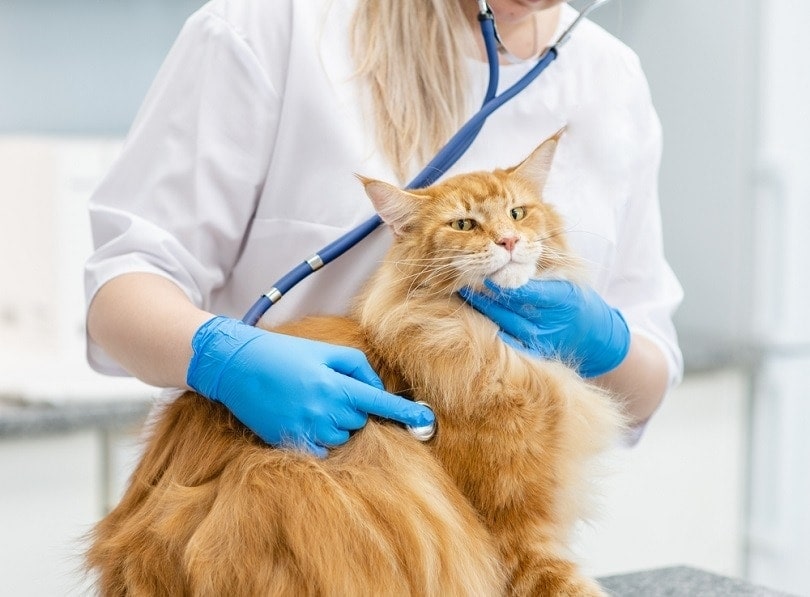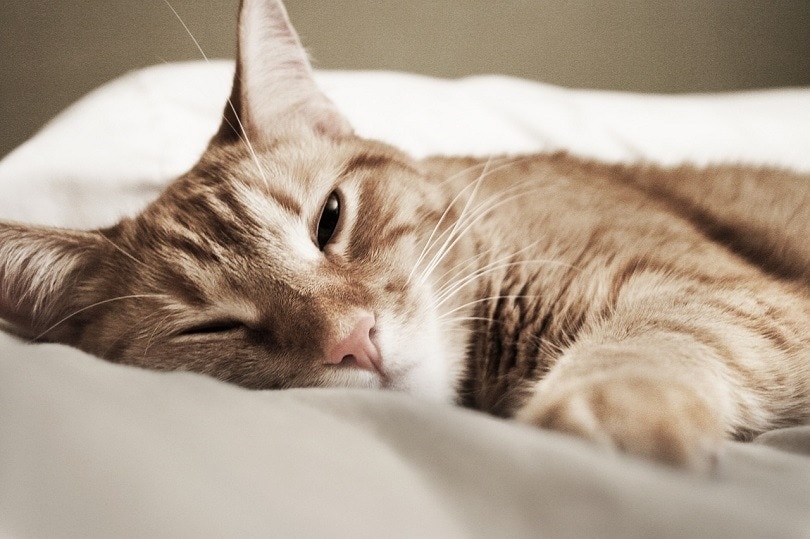
Can cats get COVID? Yes. Studies have shown that cats and dogs can catch the virus that causes COVID. It’s usually transmitted from humans to pets, and the risk of a cat infecting a person with the virus is quite remote. Some infected cats don’t become sick. Others experience mild signs, including gastrointestinal problems, difficulty breathing, and sneezing. However, most cats that catch COVID recover and are back to their old selves relatively quickly.1
What Steps Should I Take To Protect My Cat From COVID?
Keeping your cat indoors can reduce their contact with animals potentially infected with COVID (as well as other common parasites such as fleas and ticks). However, do not place a mask on your cat since it’s hazardous to their health.

Stay Away from Your Cat
If you test positive for COVID, avoid cuddling or petting your cat until you’re fully recovered; cats most often catch COVID after contact with infected people. Isolate yourself entirely from your cat if possible. If you’re the person who usually takes care of your cat’s food and litter box, consider asking someone else to step in temporarily. Don’t let your cat sleep in your bed or hang out with you while you’re recovering.
Wash Your Hands Frequently
You can also take several steps to minimize the chances of transmitting the virus to household members, including people and cats. Frequent handwashing is the best way to limit the transmission of viruses. Wash your hands with hot soapy water for at least 20 seconds before and after petting your cat. Spend extra time getting your hands nice and clean before feeding your buddy.
Don’t sneeze on your companion, and throw used tissues in covered trash cans your cat can’t get into. Consider masking up around your pet and regularly disinfect surfaces you frequently encounter, such counters.
How Can I Tell if My Cat Has COVID?
While there is a veterinary COVID test, diagnosis is often based on signs and history. Many cats infected with the virus never become sick. It can make some cats ill, but most only end up mildly under the weather after catching COVID, and the vast majority recover completely with a bit of TLC. Signs a cat may have COVID include lethargy, vomiting, and diarrhea. Some cats sneeze, have difficulty breathing, and have runny noses and coughs.
Contact your veterinarian for guidance if you suspect your cat has COVID, but give the veterinary clinic a call and explain the situation before scheduling an in-person appointment to limit the further spread of the virus. Let your cat’s veterinarian know if you’ve recently tested positive for COVID. Most practices can arrange a phone or video consultation so you can have your cat looked at without worrying about infecting other people and animals.
It’s usually possible to care for cats infected with COVID at home; speak with your veterinarian and follow their guidance for supportive care. Most cats infected with COVID need to be isolated and stay indoors until they’re sign-free for about 3 days. Keep infected pets away from humans and other four-footed family members to prevent the virus from spreading throughout the household.

Can Other Respiratory Infections Cause Similar Signs?
Feline viral rhinotracheitis (FVR) and feline calicivirus (FCV) commonly cause upper respiratory issues in cats that can mirror those seen with COVID infections. Cats suffering from these upper respiratory infections often sneeze and have runny noses. Some become lethargic and lose interest in eating.
Vaccines for FVR and FCV can help protect cats from infection, but some vaccinated cats contract the viruses. However, vaccinated pets typically have less severe symptoms and recover faster than unprotected cats. The viruses often spread in crowded conditions, such as in shelters and boarding facilities. Speak with your veterinarian about which boosters and vaccinations are appropriate for your cat.
How Are Upper Respiratory Infections in Cats Treated?
Cats generally improve from mild upper respiratory infections within about 10 days or so. But just like with people, cats need rest, fluid, and nutritious food to recover when they’re not feeling well.
Cats suffering from upper respiratory infections often aren’t interested in eating. Some can be tempted to take a few bites by adding a touch of tuna water to their food. Some cats prefer wet food, as many cats avoid kibble when sick. Increasing the amount of wet food in your pet’s diet can also help prevent them from becoming dehydrated, which often happens when cats aren’t feeling well. Make sure to wipe away any discharge around your cat’s eyes and nose.
Kitties with stopped-up noses sometimes benefit from hanging out in humidified bathrooms for around 10 minutes to ease inflamed airways. Give your pet a nice, quiet, warm place to relax while recovering, and reach out to your veterinarian if things don’t start moving in the right direction relatively quickly or your pet starts exhibiting further signs of illness such as lethargy, fever, or appetite loss.

Conclusion
Cats can catch COVID, but most don’t become terribly ill and often have mild signs. They usually come down with COVID after being in close contact with infected humans. Transmission from cats to people is quite rare. Keeping pets inside is the best way to prevent them from coming into contact with viruses such as COVID, FVR, and FCV.
If you’ve been diagnosed with COVID, limit contact with your cat until you feel better. Cats suffering from COVID should stay indoors and away from other pets and people until they’ve been sign-free for several days. Most cats recover at home and are back to their old selves relatively quickly.
- Related Read: Can a Rabbit Get COVID? Vet Approved Facts & FAQ
Featured Image Credit: Tatyana Vyc, Shutterstock






